- Home
- Bobby Akart
Fifth Column_Post Apocalyptic EMP Survival Fiction Page 5
Fifth Column_Post Apocalyptic EMP Survival Fiction Read online
Page 5
Chapter 9
January 16
Camp Lubbock
Lubbock, Texas
Duncan studied the map on the wall as his squad leaders awaited his instructions. He’d just received a report from command and control at Fort Bliss that a large mob was moving due east along Highway 62 toward Seminole. Another had infiltrated Levelland to the west of Lubbock, broken into homes and businesses, and assaulted residents before the locals began to open fire upon them. Several hundred people had been killed during the fighting.
“Okay, we’ve got our hands full,” began Duncan. “The military will focus their efforts on rounding up the refugees, which means air assets like helicopters will be unavailable to us. We are gonna be short on manpower until this crisis dies down. My orders are to maintain our units in Abilene for now and operate with a skeleton team here at Camp Lubbock. Our priorities are to close off access along the major roads into the city and respond to hot spots in the outlying areas as needed.”
“Sir,” began Espy, “we have our units deployed to West Lubbock already to assist local law enforcement. May we use our existing MPs to remain at Camp Lubbock?”
Duncan turned to his men and propped his right leg up on a chair as he twirled a Sharpie through his fingers. “How many are on duty?”
Espy quickly responded, “Twenty-eight, sir, on a rotational basis. We can incorporate double shifts if we think there’s a credible threat to Camp Lubbock.”
Duncan sighed. This was part of the reason he wanted to retrieve his TX-QRF teams from Abilene for the next several days. Quelling uprisings in these small towns of West Texas would leave Camp Lubbock and other parts of the city without adequate protection. He was already feeling stretched too thin.
“Corporal, instruct the base command to a sixteen-hour daily shift, split up by four-hour rest periods. It will be difficult for them in the near term, but no more difficult than those of us in the field. We’ve got to pull together until order is restored.”
One of his lieutenants raised his hand. “Sir, I understand the rules of engagement you’ve established. Like you, I’ve served in the Middle Eastern theater, where it was near impossible to tell a bogie from a good guy. When we come in contact with what appears to be a local or unarmed civilian, are we to engage, sir?”
“Whadya mean by engage?” asked Duncan.
“You know, ask for identification,” the lieutenant replied.
“I understand,” Duncan said as he furrowed his brow. “Show me your papers, right? Here’s my opinion. Everyone in Lubbock, and most likely in the surrounding communities, knows what’s happened. For a period of time, in order to protect them from outsiders and armed refugees, we’re going to need identification to confirm who they are. If they resist, try your best to explain. If they become belligerent, then relieve them of their weapons and possibly take them into custody with the assistance of law enforcement.”
“Yessir.”
“Listen, I’m not a policeman. I’m a soldier. I identify the enemy and I kill them. Like you, that’s how I was trained, and that’s what I do best. That said, I’ve never imagined that in my lifetime the enemy possibly would be Americans like we were once. The bottom line is this. Those who cooperate will be treated with respect. As for the others, well, as General Mad Dog Mattis said, Be polite, be professional, but have a plan to kill everyone you meet.”
“Oorah,” shouted the former members of the U.S. Marine Corps who were now under Duncan’s command.
As Duncan gave his men their marching orders, suddenly Espy burst through the door, holding the phone in his outstretched arm.
“Commander, it’s for you. Vice President Gregg has been killed.”
Chapter 10
January 16
The Armstrong Ranch
Borden County, Texas
Major slowly walked from the ranch house to the barn, where Lucy stood holding their horses. He’d received a phone call, and as he talked, he unexpectedly removed his hunting rifle and walked into the house, leaving a puzzled Lucy standing alone. When he returned, he was carrying his new Daniel Defense DD5V1 rifle.
“Is there a reason to break out the heavy artillery?” said Lucy, referring to the AR-10 long gun.
“That was Duncan on the phone. Monty Gregg was assassinated earlier today.”
Lucy’s mouth fell open before she covered it. “How? Where?”
Major folded down the foregrip, which he’d attached to the accessory rail on the barrel, and removed the magazine containing the 7.62 millimeter rounds and slipped it into his jacket pocket. The magazine protruding from the rifle prevented it from fitting into his saddle’s scabbard.
Always the gentleman, Major assisted his wife onto her horse just as Pops had taught him to open a door for a lady. The simple act of kindness and respect eventually gave way to the new feminism, which considered the gesture an insult. That wasn’t the case in West Texas.
“Apparently, he was at his place northwest of San Angelo when a sniper shot him center mass in the chest,” started Major as the frown on his face deepened. Because of the suspicions he and Duncan shared about the Kim Jong-un assassination attempt, Major privately considered Gregg’s death by a sniper bullet to be a form of karma. Nonetheless, he deserved the respect afforded a former military man and vice president of their new nation. “He was shot right in front of his wife.”
“Oh my, that poor woman!” exclaimed Lucy as she looked at Major. He sensed that she imagined what Mrs. Gregg was going through, and fear entered her mind, wondering if that could happen to her husband.
“Very sad, and mysterious,” continued Major. “Duncan didn’t have a lot of details other than the shot traveled in excess of a mile and that it had to be someone like himself to pull it off.”
“How did he react to the shooting?” asked Lucy. “I mean, there was no love lost between them.”
“Cold as ice. Unemotional is the best way I can describe it. Our son understands the game. He used to be part of it. The only thing he said was it crossed one of the names off his list. There is still one more.”
“That Yancey fella?” asked Lucy.
“Yep.”
They rode toward the barnyard to check on a calf Preacher had helped birth last night. Lucy wanted to gather eggs for pickling.
“What will Marion do about a new vice president? This has to leave a big hole in her administration.”
Major nodded as he slowed his horse’s gait. The ramifications of Gregg’s death were far-reaching. “From the standpoint of the government, Marion will need to appoint a successor, who, I imagine, has to be confirmed by the Senate and the House just like under the U.S. Constitution. From my brief conversations with her on the transition process, it appeared that her attorney general focused on taking the provisions of the Constitution that were adopted by the Founding Fathers and made them a part of the Texas laws.”
“Who will she choose?”
Major shrugged. “I have no idea. Gregg was tight with the military and had been a creature of Washington for many years. He knew his way around politicians and commanded the respect of the new Texas armed forces. His shoes will be hard to fill.”
“Dear, why would anyone want him dead? Other than our son, of course.”
Major subconsciously looked around and then turned his face toward the sky. Not too long ago, America’s advanced intelligence apparatus might’ve picked up Lucy’s words through some kind of satellite surveillance. He chuckled because the thought sounded far-fetched, but you never knew for sure.
Major eventually responded, “Duncan has a theory, and if it’s true, we might be in for trouble.”
“We as in Texas, or we as in the ranch?” asked Lucy inquisitively.
“We as in Texas. Duncan is on his way to deal with a situation in Seminole, but he said the reports he’s receiving from Fort Hood state North Koreans were involved in the attack on the checkpoints early this morning. Further, Gregg was shot within an hour of the initiation o
f those attacks. Plus, it appears the North Koreans were driving U.S. Army vehicles.”
“Major, would President Harman be so bold as to invade Texas when she’s got a mountain of problems to deal with? Shouldn’t she focus on her own problems instead of stirring up new ones?”
They had arrived at the barnyard, and several ranch hands were milling about, so Major pulled his horse to a stop to finish the conversation. “I don’t know anything about President Harman other than my opinion that she was soft on national defense and seemed to focus entirely on spending us into oblivion, not that it matters anymore. I can assume, however, Gregg’s defection from her cabinet to the vice presidency in Texas put quite the burr in her saddle. It was pretty disrespectful on Gregg’s part, but he obviously saw an opportunity when it presented itself.”
Lucy adjusted herself in the saddle and stretched her back, which had been bothering her. “Would she order Gregg killed?”
“I don’t think so, but you know how things operate in Washington. Presidents don’t run things. Shadow governments do.”
“Duncan was right about the Koreans, wasn’t he?”
Major nodded. “I believed him from the beginning. He’s not one to embellish a story. He doesn’t have to. His experiences are more real than a novel or a movie. The question really becomes—who do the North Koreans work for? Washington or Pyongyang?”
Chapter 11
January 16
Patricia, Texas
In a politically and economically volatile world, energy security became an increasingly important aspect of a nation’s governance. As modern times were ushered in with the development of fuel-driven machinery, developed nations became dependent on the production of electricity to compete economically and to satisfy its citizenry on the domestic front. The stable and secure flow of electricity became an imperative for all national governments as the twentieth century was ushered in, both for basic household needs and for industrial progress.
Given this critical role electricity played in the economic success of the United States, it was natural that rogue nations and bad actors, who were either jealous of America’s place in the world or hostile to the freedoms and ideals upon which she stood, would look for a way to knock the greatest nation on earth to its knees.
Advanced technology provided these bad actors a myriad of options to destroy America’s power grid. Initially, it was the discovery of the electromagnetic pulse, a byproduct of nuclear warfare uncovered during the nuclear testing of the fifties and early sixties.
Next, the wired world dominated by internet activity presented a portal into every power-generating system for armies of computer hackers, some working for a nation-state, or so-called patriotic hackers who were not state-sponsored, but who acted on their behalf as part of a perceived patriotic duty.
Cyber attacks became an integral part of asymmetric warfare after the start of the twenty-first century as a means to disrupt a nation’s power supply in advance of a conventional military attack. Russia was notorious for successfully using this tactic.
North Korea’s EMP attack upon the United States was a variant of the Russian use of cyber warfare. After collapsing the Eastern and Western Interconnection power grids, the DPRK’s imbedded commandos, together with additional forces making their way to North America, would take out additional critical infrastructure such as communications, transportation, and as many of the other fourteen essential services relied upon by Americans as possible.
The failure to destroy the Texas power grid was not anticipated by the North Korean war planners. After the EMP bursts were partly successful, the nuclear bombs flying in both directions should have finished the job. Yet Texas stood strong against the worst military conflict in the history of mankind.
However, General Lee and his Lightning Death Squads would not be deterred. They were trained in the art of sabotage and insurgency. In Lee’s mind, what couldn’t be destroyed by bombs or keystrokes on a computer could still be rendered inoperative by bullets and knives.
The planned attacks on the Texas power grid were to be old-school operations involving speed, cunning, and precision. They required fearless men who were prepared to die for Dear Leader in order to accomplish their mission. The key to success was preplanning, the coordination of movement to ensure surprise, and the tenacity of his men.
Holloway had rolled out a large map of Texas on top of the geography teacher’s desk. He retrieved his notes from the ERCOT substation in Wink and referred to them as he pointed to the circles made by a black Sharpie on the map.
As a state, Texas was the crown jewel of America’s energy production. It had been the leading oil-producing state, producing more than a third of the country’s crude oil. The twenty-nine petroleum refineries within its borders accounted for more than thirty percent of the total U.S. refining capacity. Texas led the nation in wind-powered generation capacity and was also the largest producer of lignite coal, which powered roughly fifty percent of the coal-fired plants producing electricity.
This energy self-sufficiency was one of the key reasons political leaders like Marion Burnett believed Texas could secede from the United States and quickly become a viable nation on its own. But energy production was only half of the equation. The electricity generated by these varied sources must be distributed to government facilities, businesses, and households through the power grid—a complex system of electricity substations, transformers, and power lines.
Most grids were interconnected for reliability and cost efficiency. Consumers demanded a steady flow of electricity at the lowest possible cost. In order to satisfy consumer demands, larger and larger interconnected networks were created so that outages in one area could be supplemented by others.
However, this desire to please the demanding consumers of America created a vulnerability. When a severe blackout occurred in a large area, additional burdens were placed on the working components of the power-generating systems asked to pick up the slack. If the failure overwhelmed the system, then a cascade of failures across a larger part of the grid occurred.
When the EMP had struck the coastal regions of the U.S., the cascading failure had occurred throughout the interconnected grid. Within the ERCOT system of Texas, a similar system was established and, thus, was vulnerable to a cascading failure on a smaller scale.
Visually, one could see the high-power transmission lines connecting homes and businesses to a power-generating station somewhere. But the hub of the activity, the source of control of that power, was a substation. At the substations, the high-voltage electricity that ran through those power lines and ultimately to the end user had to be reduced in its level of power—from high voltage to low.
For purposes of terrorist attacks, or Lee’s mission in Texas, the substations were the target. Generally, these substations scattered throughout the ERCOT power grid remained unattended, relying upon SCADA for remote supervision and control. SCADA was an acronym for supervisory control and data acquisition, a marvel of computer technology that created the ultimate method of delivering electricity efficiently at the lowest cost. The SCADA systems, however, were also highly vulnerable to cyber attacks.
Lee was out of EMPs, and the North Korean cyber army known as Bureau 121 had most likely been destroyed by the nuclear warheads delivered by an assumed American counterattack. The unprotected power substations, when destroyed, would throw the Texans into darkness with the rest of North America.
“Here’s what the guy at the substation told me,” began Holloway. “According to a Department of Energy report, there are two substations in Texas that are most likely to cause a statewide blackout if taken down.”
Lee looked at the map and counted the circles. “Which two? There are eighteen marked on this map.”
“He didn’t know, and he said it was a closely guarded secret within ERCOT,” replied Holloway. “He identified the eighteen largest distribution substations around the state that are nearest their power-generating plants.”
/> “Did he tell you how to destroy them? How do we make them stop functioning?”
“We strike them simultaneously, destabilizing the grid and causing a blackout across Texas.”
“I understand that, but what do we do specifically to make that happen?” asked Lee.
“There’s a substation to our south near Midland,” replied Holloway. “Let’s take your key people there now and do some surveillance. The best way to plan your attack is to study what you’re attacking.”
Chapter 12
January 16
Seminole, Texas
“Come on, Corporal, pick up the pace!” shouted Duncan out of frustration as he rode in the passenger seat of his Humvee. An hour ago, Camp Lubbock had been notified that armed men had stormed several homes in Seminole, Texas, looting them for their food and, in some cases, killing the occupants. Local law enforcement had been decimated by defections, and the skeleton crew in place was quickly overwhelmed, prompting the call to the TX-QRF.
“Sir, I can go faster, but we’ll leave the troop transports and the support vehicles behind,” replied Espy.
Duncan ignored Espy’s response and studied a map of Seminole obtained from his father’s old offices at Company C headquarters in Lubbock. The town was due east of the Hobbs checkpoint, which had been breached, and was the first logical source of armed conflict.
With a relatively small population of just under seven thousand, there were no strategic military or government assets to defend in Seminole. Duncan had no idea how people in the small town were faring as a result of the collapse, but they deserved to be protected.

 Geostorm The Collapse: A Post Apocalyptic EMP Survival Thriller (The Geostorm Series Book 3)
Geostorm The Collapse: A Post Apocalyptic EMP Survival Thriller (The Geostorm Series Book 3)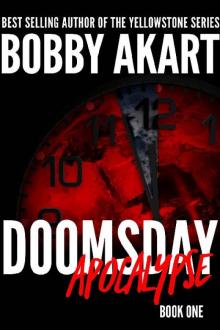 Doomsday Apocalypse
Doomsday Apocalypse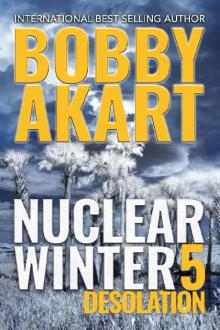 Nuclear Winter Desolation: Post Apocalyptic Survival Thriller (Nuclear Winter Series Book 5)
Nuclear Winter Desolation: Post Apocalyptic Survival Thriller (Nuclear Winter Series Book 5)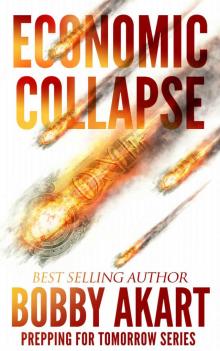 Economic Collapse (Prepping for Tomorrow Book 2)
Economic Collapse (Prepping for Tomorrow Book 2)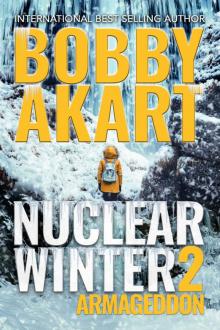 Nuclear Winter Armageddon
Nuclear Winter Armageddon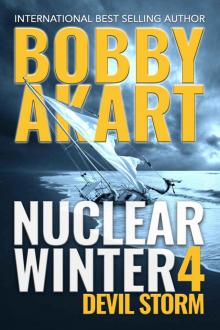 Nuclear Winter Devil Storm
Nuclear Winter Devil Storm Virus Hunters 3: A Medical Thriller
Virus Hunters 3: A Medical Thriller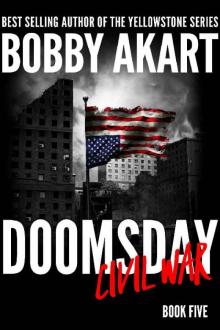 Doomsday Civil War: A Post-Apocalyptic Survival Thriller (The Doomsday Series Book 5)
Doomsday Civil War: A Post-Apocalyptic Survival Thriller (The Doomsday Series Book 5)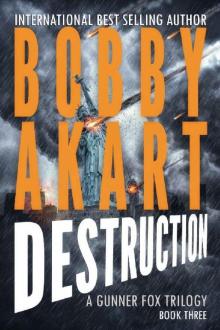 Asteroid Destruction
Asteroid Destruction Geostorm the Shift
Geostorm the Shift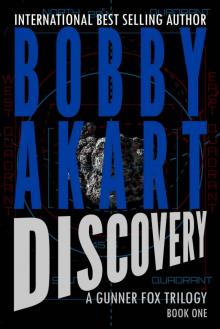 Asteroid Discovery
Asteroid Discovery Virus Hunters 2: A Medical Thriller
Virus Hunters 2: A Medical Thriller Geostorm The Shift: A Post-Apocalyptic EMP Survival Thriller (The Geostorm Series Book 1)
Geostorm The Shift: A Post-Apocalyptic EMP Survival Thriller (The Geostorm Series Book 1) Asteroid Diversion
Asteroid Diversion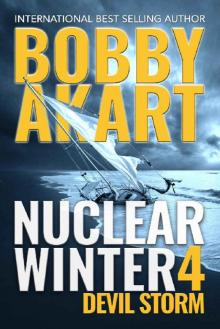 Nuclear Winter Devil Storm: Post Apocalyptic Survival Thriller (Nuclear Winter Series Book 4)
Nuclear Winter Devil Storm: Post Apocalyptic Survival Thriller (Nuclear Winter Series Book 4)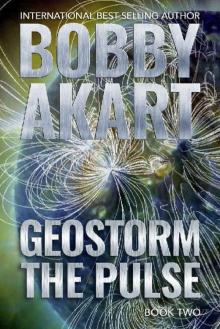 Geostorm The Pulse: A Post Apocalyptic EMP Survival Thriller (The Geostorm Series Book 2)
Geostorm The Pulse: A Post Apocalyptic EMP Survival Thriller (The Geostorm Series Book 2)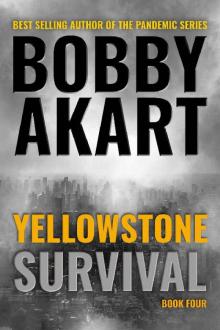 Yellowstone: Survival: A Post-Apocalyptic Survival Thriller (The Yellowstone Series Book 4)
Yellowstone: Survival: A Post-Apocalyptic Survival Thriller (The Yellowstone Series Book 4)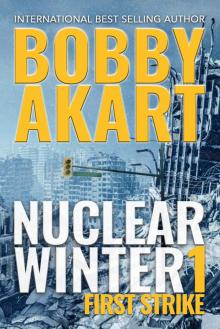 Nuclear Winter First Strike: Post-Apocalyptic Survival Thriller
Nuclear Winter First Strike: Post-Apocalyptic Survival Thriller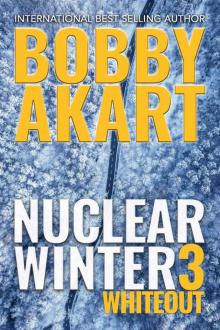 Nuclear Winter Whiteout
Nuclear Winter Whiteout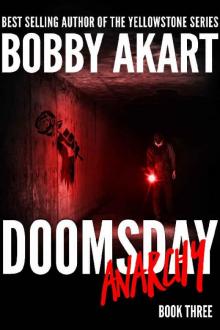 Doomsday Anarchy
Doomsday Anarchy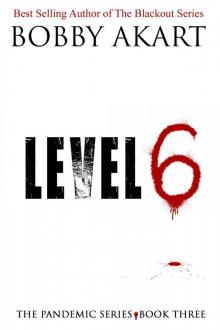 Pandemic: Level 6: A Post Apocalyptic Medical Thriller Fiction Series (The Pandemic Series Book 3)
Pandemic: Level 6: A Post Apocalyptic Medical Thriller Fiction Series (The Pandemic Series Book 3) Martial Law
Martial Law Odessa Reborn: A Terrorism Thriller (Gunner Fox Book 4)
Odessa Reborn: A Terrorism Thriller (Gunner Fox Book 4)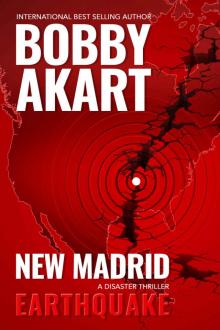 New Madrid Earthquake
New Madrid Earthquake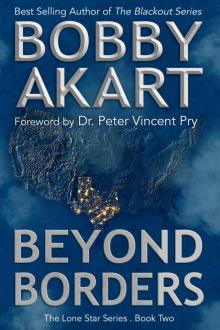 Beyond Borders: Post Apocalyptic EMP Survival Fiction (The Lone Star Series Book 2)
Beyond Borders: Post Apocalyptic EMP Survival Fiction (The Lone Star Series Book 2)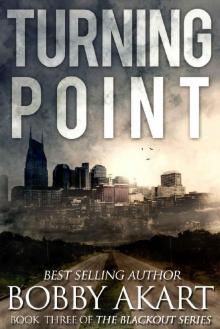 The Blackout Series (Book 3): Turning Point
The Blackout Series (Book 3): Turning Point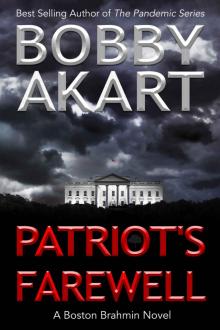 Patriot's Farewell: A Political Thriller Fiction Series (Boston Brahmin Political Thrillers Book 7)
Patriot's Farewell: A Political Thriller Fiction Series (Boston Brahmin Political Thrillers Book 7) Lines in the Sand_Post Apocalyptic EMP Survival Fiction
Lines in the Sand_Post Apocalyptic EMP Survival Fiction The Mechanics: A Post-Apocalyptic Fiction Series
The Mechanics: A Post-Apocalyptic Fiction Series The Loyal Nine
The Loyal Nine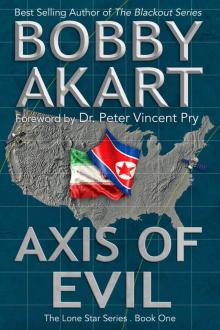 Axis of Evil
Axis of Evil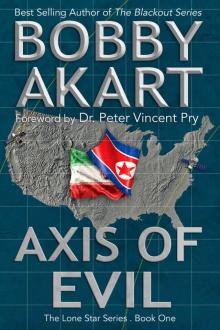 Axis of Evil: Post Apocalyptic EMP Survival Fiction (The Lone Star Series Book 1)
Axis of Evil: Post Apocalyptic EMP Survival Fiction (The Lone Star Series Book 1) Lines in the Sand: Post Apocalyptic EMP Survival Fiction (The Lone Star Series Book 3)
Lines in the Sand: Post Apocalyptic EMP Survival Fiction (The Lone Star Series Book 3) Odessa Strikes
Odessa Strikes The Blackout Series (Book 4): Shiloh Ranch
The Blackout Series (Book 4): Shiloh Ranch Hornet's Nest: A Post Apocalyptic EMP Survival Fiction Series (The Blackout Series Book 5)
Hornet's Nest: A Post Apocalyptic EMP Survival Fiction Series (The Blackout Series Book 5)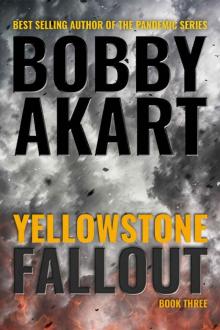 Yellowstone: Fallout: A Post-Apocalyptic Survival Thriller (The Yellowstone Series Book 3)
Yellowstone: Fallout: A Post-Apocalyptic Survival Thriller (The Yellowstone Series Book 3)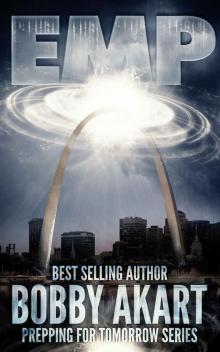 Electromagnetic Pulse
Electromagnetic Pulse Texas Strong: Post Apocalyptic EMP Survival Fiction (The Lone Star Series Book 4)
Texas Strong: Post Apocalyptic EMP Survival Fiction (The Lone Star Series Book 4)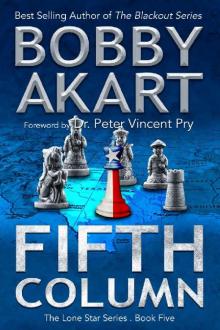 Fifth Column_Post Apocalyptic EMP Survival Fiction
Fifth Column_Post Apocalyptic EMP Survival Fiction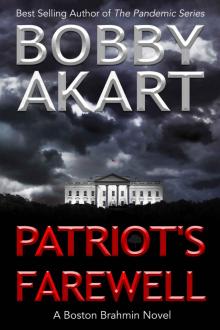 Patriot's Farewell
Patriot's Farewell Texas Strong_Post Apocalyptic EMP Survival Fiction
Texas Strong_Post Apocalyptic EMP Survival Fiction Pandemic: The Innocents: A Post-Apocalyptic Medical Thriller Fiction Series (The Pandemic Series Book 2)
Pandemic: The Innocents: A Post-Apocalyptic Medical Thriller Fiction Series (The Pandemic Series Book 2) Shiloh Ranch: A Post Apocalyptic EMP Survival Fiction Series (The Blackout Series Book 4)
Shiloh Ranch: A Post Apocalyptic EMP Survival Fiction Series (The Blackout Series Book 4)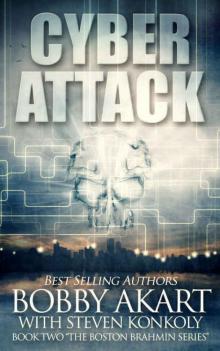 Cyber Attack
Cyber Attack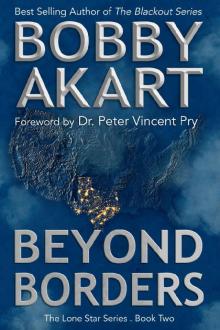 Beyond Borders
Beyond Borders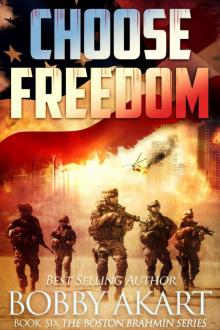 Choose Freedom: A Post-Apocalyptic Fiction Series (The Boston Brahmin Book 6)
Choose Freedom: A Post-Apocalyptic Fiction Series (The Boston Brahmin Book 6) False Flag
False Flag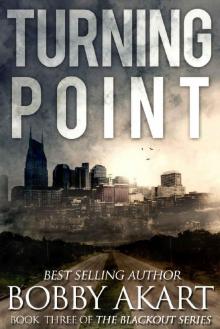 Turning Point: A Post Apocalyptic EMP Survival Fiction Series (The Blackout Series Book 3)
Turning Point: A Post Apocalyptic EMP Survival Fiction Series (The Blackout Series Book 3)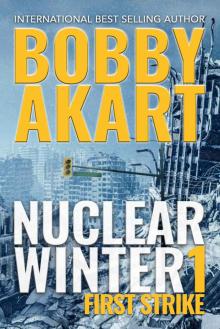 Nuclear Winter First Strike
Nuclear Winter First Strike Pandemic: Beginnings: A Post-Apocalyptic Medical Thriller Fiction Series (The Pandemic Series Book 1)
Pandemic: Beginnings: A Post-Apocalyptic Medical Thriller Fiction Series (The Pandemic Series Book 1) Devil's Homecoming: A Post Apocalyptic EMP Survival Fiction Series (The Blackout Series Book 6)
Devil's Homecoming: A Post Apocalyptic EMP Survival Fiction Series (The Blackout Series Book 6) The Blackout Series (Book 6): Devil's Homecoming
The Blackout Series (Book 6): Devil's Homecoming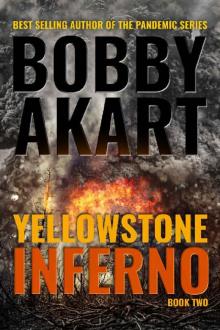 Yellowstone: Inferno: A Post-Apocalyptic Survival Thriller (The Yellowstone Series Book 2)
Yellowstone: Inferno: A Post-Apocalyptic Survival Thriller (The Yellowstone Series Book 2)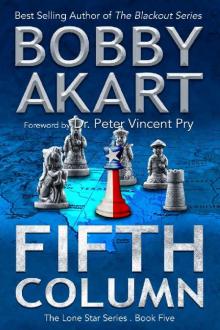 Fifth Column: Post Apocalyptic EMP Survival Fiction (The Lone Star Series Book 5)
Fifth Column: Post Apocalyptic EMP Survival Fiction (The Lone Star Series Book 5)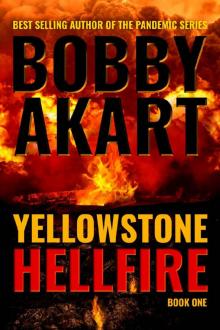 Yellowstone: Hellfire: A Post-Apocalyptic Survival Thriller (The Yellowstone Series Book 1)
Yellowstone: Hellfire: A Post-Apocalyptic Survival Thriller (The Yellowstone Series Book 1) The Blackout Series (Book 2): Zero Hour
The Blackout Series (Book 2): Zero Hour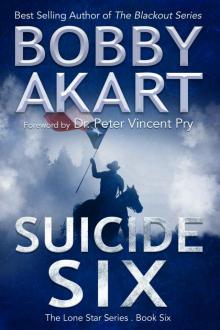 Suicide Six: Post Apocalyptic EMP Survival Fiction (The Lone Star Series Book 6)
Suicide Six: Post Apocalyptic EMP Survival Fiction (The Lone Star Series Book 6)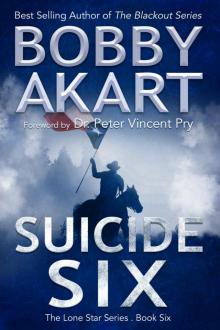 Suicide Six_Post Apocalyptic EMP Survival Fiction
Suicide Six_Post Apocalyptic EMP Survival Fiction Zero Hour: A Post-Apocalyptic EMP Survival Fiction Series (The Blackout Series Book 2)
Zero Hour: A Post-Apocalyptic EMP Survival Fiction Series (The Blackout Series Book 2)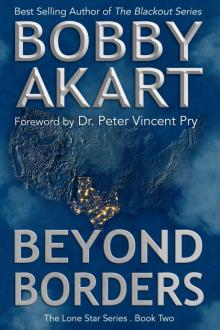 Beyond Borders_Post Apocalyptic EMP Survival Fiction
Beyond Borders_Post Apocalyptic EMP Survival Fiction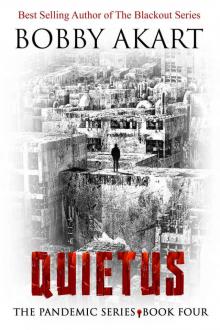 Pandemic: Quietus: A Post-Apocalyptic Dystopian Fiction Series (The Pandemic Series Book 4)
Pandemic: Quietus: A Post-Apocalyptic Dystopian Fiction Series (The Pandemic Series Book 4) 36 Hours: A Post-Apocalyptic EMP Survival Fiction Series
36 Hours: A Post-Apocalyptic EMP Survival Fiction Series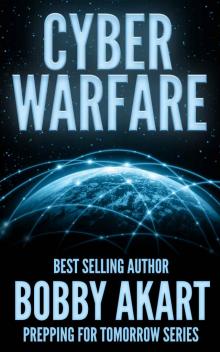 Cyber Warfare
Cyber Warfare